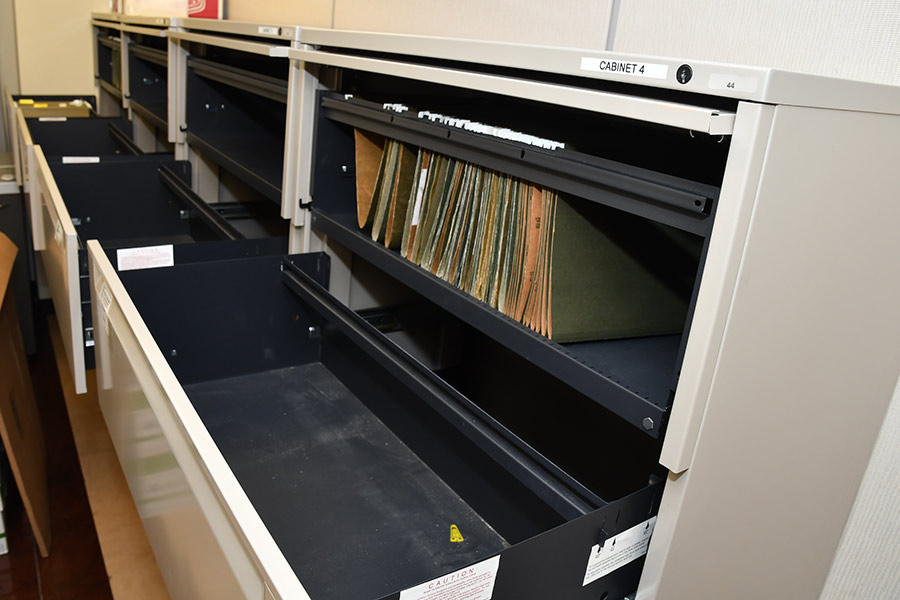OAFA moves online one file cabinet at a time

Five years ago, the McGovern Medical School Office of Administration and Faculty Affairs embarked upon a plan to digitize all of its paper files and processes. Today, they are free of numerous file cabinets and have streamlined operations.
“My dream of making the office completely electronic is coming to fruition,” said Kevin Morano, PhD, associate dean for Faculty Affairs. “We have scanned all of our current files and shredded the previous 30 years of paper, within our Records Retention guidelines.”
The move to digital from paper files started years ago with process improvement meetings. “We created a list of what we wanted to do,” recalled Erin Wells, administrative manager of the Office of Administration and Faculty Affairs. “When I first got here, there was an overwhelming amount of paper – from procurement files to faculty files.”
The office started with digitizing procurement files. The office also made moves to streamline and digitize documents needed for the annual faculty reappointment process. “We used to give spreadsheets to departments to print and sign to return to us as hardcopies. We would also ask for numerous other hard copies of transactions that were submitted electronically. Now we have all signed documents, as well as the completed Excel file, returned to us via email,” Wells explained.
The transition ramped up once COVID started. “Once COVID hit, we started only accepting requests digitally,” Wells said.
The move to online means no more folders full of papers to be signed by the dean, or his designate.
“Pre-COVID, these folders would move around a lot, and it was especially challenging if a signature was needed in a hurry,” Wells said. “We would have instances where someone was out of the office and we’d have to check each other’s desks if we needed to locate a specific folder for a rush request. We would also have customers drop off their folder, but maybe someone else in the department would pick it up and not return it to them immediately, or let them know they had it before they came back to our office looking for it. Now everything can be seen, acted upon, and tracked online.”
The office has adopted digital signature via PDF for signing – something unheard of before COVID.
“With staff working remotely due to the pandemic, this was a push to get several projects going online for us,” said Johnson George, executive director of Administration and Faculty Affairs. “It would have been difficult to realize the efficiencies in the processes if we were all on paper and working hybrid. Now we are just a couple of clicks away instead of running to a file cabinet. Our office is an excellent example of what can be accomplished when the entire team works together to achieve a common goal. The leadership and vision of Drs. McNiel and Morano played a key role in what we have achieved today.”
With the help of Medical School Information Technology, the office designed a digital Faculty Information System (FIS) – in place as of September, 2021. “This is an online repository of all of our faculty data, including offer letters, transcripts, reappointments, faculty temporary licenses, CVs, annual faculty reviews – everything is in one accessible place for our office,” George explained, adding that there are nearly 1,700 faculty members with files in the process of being digitized.
The volunteer faculty/without salary appointment process is also wholly electronic and after piloting at MMS, is now used by all schools on campus.
It has been a slow process to scan all existing faculty personnel files into the FIS, thereby removing the need for file cabinet after file cabinet. “We have gone through two different purges with the shredding company, and we are ready for round three,” Wells said.
The online move has resulted in several gains.
“Efficiency and time have been a big win for us,” George said.
“The online systems also help with accountability – nothing gets lost in the shuffle, it is easier to hand off a job to someone in the office, and we’ve noticed a quicker turnaround time,” Wells said.
Signature approvals on urgent offer letters can now see a completion time of fewer than four hours in some instances. “That was virtually impossible before since we relied on paper and courier,” Wells said.
“Ultimately we are providing better customer service to the departments through accessibility and transparency,” George said, adding that moving information online has simplified institutional reporting requirements for the office.
The job moving to paper-free continues.
“We still have ambitious goals to accomplish, and there is still a lot of scanning ahead,” George said.